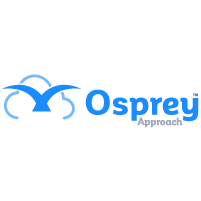Find out the six ways that SME law firms can attract and retain talent with Osprey Approach
For the fourth episode of Osprey Approach’s Build Better Habits webinar series, Amy Bruce, marketing manager at Osprey, was joined by Leah Steele, Owner of Searching for Serenity, Joanna Gaudoin, Director at Inside Out Image, and Tim Kidd, CEO at The Institute of Legal Finance & Management (ILFM) for a thought-provoking discussion around the importance of SME law firms attracting and retaining great people across their practices.
The panel shared their thoughts and recommendations on how law firms can implement an effective workplace culture that empowers employees, retains talent, and improves overall performance for the long term.
What is an ‘empower employee’ mindset?
The session began by asking the panel what this mindset means for modern law firms. Joanna highlighted the link between empowerment and career development and why employees should, “put some time in the diary every week to work on your career. It’s important that the employer is supportive of that so individuals can ask about their current skill gaps, or how they can progress.”
Tim agreed, adding that ILFM members are encouraged to “concentrate on training and qualifications, because knowledge will lead to improved confidence, and people with confidence perform their jobs better.”
Leah pointed out the importance of learning from everyone in the team: “[It] is about unlocking the traditional hierarchy structure that says the person at the top knows more, and instead widening it out to say, ‘what do we all know?’… We can get a much richer source of information that way.”
Addressing retention and hiring challenges in the legal sector
It requires less resource to retain talent than it does to hire new. Joanna highlighted the importance of fostering employee relationships and explained that “we need to start with ourselves and understand the impact we’re having and our own strengths before we can work better with others.”
Leah added that it’s important to question existing processes when adopting a different mindset: “We need to ask the right questions like, ‘what haven’t we considered?’ There needs to be time to reflect and consider change. It’s about having a curious mindset.”
Training and skills development is key for progression, but law firm’s shouldn’t underestimate the importance of emotional development and social skills.
Tim commented on how the ILFM empowers its employees: “it’s about people feeling valued and recognition is a huge thing as far as I’m concerned.
“You need to be understanding, caring, [and] ensure they have the right equipment, training, and support.”
Six ways to implement an empower employee mindset successfully
The panel agreed there are six ways – six core business habits – that modern law firms can implement an empower employee mindset successfully – and reap the benefits for the long term.
Increase channels for feedback
Staff need to feel safe when proving feedback, especially if it’s negative. Leah suggested providing multiple ways for staff to give feedback and encourage openness, such as “having an external consultant come in, someone that’s anonymous, confidential, and removed from the environment. Allow email feedback, ask surveys, and provide anonymous structures to give people safety.”
Model the desired behaviour
Improved human connection and positive change are needed for a more effective workplace culture. Leah said that for a culture shift to happen, the desired behaviour needs to be modelled by law firm leaders: “Transparency, vulnerability, and curiosity needs to be visible. Managers should share experiences when they weren’t sure or got things wrong. You shift the culture by modelling it for others to see.”
Regular staff feedback
A report by LawCare found that regular ‘catch-ups’ were the most effective support measure in law firms. Joanna pointed out that “If you’re only giving feedback once a year it’s hard to remember what happened months ago. Regular feedback will enable everyone to develop and improve.”
Leah added that it’s important “to create multiple forms of incidental contact to allow us to walk through that open door.”
Eliminate workplace fear
Tim said there’s a huge difference between respect and fear: “It’s important to eliminate fear from your culture, but it can be achieved by encouraging people to ask questions – and the way you encourage people to ask is to say “yes” often.”
Team engagement
Joanna pointed out that dedicating time to team and firm-wide engagement events, or activities, is vital for better communication, adding that “it’s how individuals will get to know each other which then helps strengthen team performance”.
Tim emphasised the importance of kindness right across the business. “That’s what it comes down to: being as kind as you possibly can. It will improve productivity… It will improve [the] workforce. It will improve retention. In every way you possibly can try and be kind, and that will really come across and improve everything that you do. And I think that’s an important thing we can all take away in our workplaces today.
Genuinely listen
Joanna advised that leaders should “ask questions of [their] employees and genuinely listen to the answers, rather than listening to respond. People want to be heard to feel part of a group, and if you’re only listening to immediately offer advice or add your opinion, employees can feel overlooked.”
Leah echoed this and said that it’s important to “listen to people. Create the opportunities to listen to people… to hear from them independently outside of check ins, outside of file reviews. We need those multiple streams of contact in order to actually hear what’s going on and stop assuming that people will say ‘they’ll come to me if it’s a problem.’”
Empower employees for long term success
Although it’s important that firms think about growing profit margins, completing client work to a high standard, and having a high level of productivity, all those things naturally improve by empowering your staff which, in turn, will help to ensure your teams are motivated, passionate, and loyal.
Having an empower employee mindset is one of four habits that modern law firms should adopt for long-term success. We have covered all four habits in our Build Better Habits webinar series, which you can watch on-demand now.
To gain further insight and contributions from the panel, you can watch the episode on-demand now, or you can read the full webinar round-up here.
Osprey Approach provides cloud-based, case management software to SME law firms. With over 30 years’ experience in the legal software sector, Osprey’s system, implementation, and support services are designed to help make running a law firm easier.



